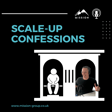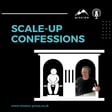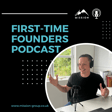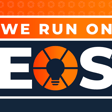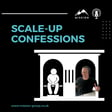Become a Creator today!Start creating today - Share your story with the world!
Start for free
00:00:00
00:00:01

Preview of Dean Breyley’s masterclass at the 'We Run on EOS' European Conference (27 Sep 24)
If you're into EOS, be sure to print a copy of your Accountability Chart and take it to Dean Breyley's "The Devil is in the Accountability Chart" masterclass at the We Run on EOS European Conference on 27 September (11:40-12:25 in the Main Space).
Dean has facilitated over 600 full day EOS Leadership Team sessions and will draw on his full experience to help you sense check - ie with interactive examples - how many of your company's issues trace back to structure (it could be as many as 80%).
Get your ticket here: https://www.tickettailor.com/events/eosworldwide/1227926 (ask your EOS Implementer for their discount code for 40% (c. £200) off or please feel free to use code "EOSI-RobL" if you don't have one)
Transcript
Introduction to First Time Founders Podcast
00:00:00
Speaker
Hello, welcome to another episode of the First Time Founders Podcast, the show where we talk about how to start a business from nothing and grow it into something meaningful. I'm Rob Lydiard. I was the founding CEO of a software business called Yapster that was acquired in 2022. I'm now a professional implementer of the entrepreneurial operating system or EOS, which means I work with entrepreneurs to help them get what they want from their businesses using the tools of the entrepreneurial operating system.
Upcoming EOS Event in London
00:00:25
Speaker
Today, I'm doing the first of a series of mini episodes, introducing listeners to my friends that are also professional, certified and expert implementers of the entrepreneurial operating system, because we're all coming together to get together as part of the European EOS community. ah Entrepreneurs running on EOS, entrepreneurial executives working in leadership teams running on EOS, and indeed implementers, folks that work with those teams to get more of their business using the tools in a masterful way.
00:00:55
Speaker
um We're all going to be hosting various different sessions on the day. It's at 133 Houndsditch on Friday the 27th of September. So if you haven't got a ticket yet, make sure you do. There'll be a link to wherever you're consuming ah this video or listening to this audio now.
Introduction to Dean Braley's Masterclass
00:01:11
Speaker
Today, the first in this series, I'm speaking to Dean Braley. Dean's one of the OGs of the European EOS implementer community. He's done more than 600 sessions. and Really, really thoughtful guy about how entrepreneurial teams can use the EOS tools to really elevate their business, solve their most difficult problems, to unlock their next wave of growth or whatever it is that they're looking for to
00:01:38
Speaker
to realize their vision achieved their business dreams. Now Dean has chosen to do a kind of masterclass on the 27th of September around the accountability chart. It's one of the foundational tools. It's one of the most important things that you'll ever do as an entrepreneur using the EOS tools.
Importance of Revisiting the Accountability Chart
00:01:53
Speaker
And yet for many, they visit their on their accountability chart on like a focus day, the first day that they might be working with an implementer or the first session if they're self implementing where they get together with their leadership team, they then tick it off as done and sadly don't come back and reinvestigate and test that accountability chart nearly as frequently and as vigorously as they frankly should. Because as Dean will tell you on the day and tease you today, the devil is almost always in the accountability chart. So if you're an EOS aficionado or new to this world and just thinking about maybe coming and joining us on the 27th of September in London, you're gonna get a lot from this clip. So enjoy my conversation with Dean Braley.
00:02:43
Speaker
EOS
Interactive Session on Organizational Structures
00:02:44
Speaker
Europe's answer to Brad Pitt. Mate, some have said it's it's more like the guy from Take That. What's his name? I forgot. Gary Barlow. Gary Barlow, that's it. More Gary Barlow than Brad Pitt, but I'll take either way.
00:02:57
Speaker
Thank you for making the time to do this. I know you're a busy man. My pleasure, mate. Always, always time for you, Rob. ah So we're here today teasing the ah We Run on EOS conference and your your expert session um on the accountability chart and the devil is in the accountability chart. now Now, no doubt you haven't completely finished everything that you're going to say. So I thought maybe we'd do a look ahead and almost peer inside the the green room, the so the sort of pre-speech kind of where all the actors hang out and just think about like how are you thinking about the talk and what do you want people to think and feel when they leave that session? Absolutely mate, well okay how I want them to feel is a renewed connection to oh my god this is one of the most fundamental important tools that we're totally overlooking and I want teams to go away and re-energize and re-vigorate themselves and use structure as a strategy like
00:03:49
Speaker
if I think to the toolbox and we teach the tools in the early part of the process and talk about accountability chart and it's always next level. I think teams go through the process of doing it and they kind of tick in the box and say we've done that and then it just gets lost and then we talk about rocks and meeting posts and scorecards and all of the stuff that they have this real tangible connection to. But the root of all the evil is in their accountability chart. So, you know, really going back to I want every leader to really be using their structure as a strategy and review on it and reflect on it and and look at where the bottlenecks constraints capacity issues are and feel that this is their number one tool for figuring out what the
Overlooked Structural Issues in Business
00:04:30
Speaker
next moves are. You know, it's like the chessboard. If I can get if I can get them to connect to that and leave that passionate about the accountability chart as passionate as I am, in case you may have
00:04:40
Speaker
not not pick that up by now. Yeah, I've done a good job with the talk for sure. What are some, I mean, you've obviously run, I mean, how many sessions have you done now, roughly? Oh my goodness. Yeah, I have nearly 650. A crazy number of sessions. What would you say are some of the the most common failure modes around the accountability chart? So if someone's if someone's listening to or watching this teaser and they don't think that there's anything they don't know about the accountability chart or some gnarly issue that they're experiencing but don't even recognize yet, what are some of the classic accountability chart issues that they might be experiencing?
00:05:12
Speaker
ah So it's the overlooking the things you know we go back to always go to the root of where your issues are in friday s somebody always owns an issue right you could you can use your accountability chart for going. That's where the issue sits this person owns it that's the person that should be solving it or coming up with a solution or we should be picking their brains for how we move forward with this rather than just solving what is right in front of us. You really real real realw world example i was set with the team the other day. And we were talking about their issues list, like it was, I think 45, 50 items long. And I highlighted every single issue on there that at some point related to an accountability structure, leadership and management issue. And I kid you not, it was like four fifths of that issues list all went down to if they just got the right structure, if they just sorted the people issues out and then led or managed it. Well, all those rest of those issues go away.
Achieving Company-wide Accountability
00:06:04
Speaker
So I think that teams.
00:06:06
Speaker
underestimate the power of going to that right person right seat I mean if you can see the bookshelves behind me right like every single book on there the first thing it screams is find the right who's put the right who's in the right seats and most of the other stuff just takes care of itself and and so that that really is who are the right who's and what is the right work for these people you get to that it's alchemy and half of the other stuff just takes care of itself and so i think it's the underestimation of that and we spend so much time trying to kick people up the arse or you know pat them on the back trying to get more out of them than the right people would just do if you just had the right people in the right seats so yeah for me it's it's most people just overlook
00:06:46
Speaker
the the issues and don't really figure out how much of this relates to issues in their accountability chart, issues with the structure. Why do you think it is that like structural issues are so common? like what is it or like On a human level, as entrepreneurs, why are we so susceptible to this? Yes, it's because we can't see it. It doesn't it doesn't really exist. you know If I think to all the rest of our tools, they're really tangible. The rocks are written down. There's a smart objective around it. you know We can connect to that and we can put a plan in place. Scorecard. It's difficult to to argue with a scorecard. It's right in front of you. It's the ones and the zeros. The numbers are there. i think
00:07:21
Speaker
The intangibility of connecting what happens to to what we've got documented in in the is it's almost where the disconnect happens. you know We have this bit of paper that yeah know sometimes out of sight, out of mind, because your accountability chart very rarely is front and center. um you know, we're right in the middle of the euros at the moment. So, you know, like structure is really important because if any of those teams don't have those 11 people playing in the right position, or again, understanding when they can play out a position for the greater good, you know, because sometimes you can bend and break the rules. But it's all done by design, not by accident. And yet we're so busy in businesses just being busy on the day to day that I think we we just disconnect.
00:08:00
Speaker
from actually who's playing in the right position, who's playing out position, who owns the stuff, right?
Practical Insights for Accountability Charts
00:08:05
Speaker
and and And where that handover of accountability happens. I think it's that, it's all a bit of a fugazi, right? It just doesn't really exist. It's not tangible. So people can quite easily just disconnect from it. Well, I remember going to um an EOS European conference two years ago. It was the first one that I'd been to. I was running EOS at my company at the time, the App Store software business. So I was running it running it on EOS. I was feeling like it was changing my life. Like all the kind of people with a visionary bias, right? You're doing like half of it, but you're convinced that you're like, you've nailed it. And I came to that conference and my favorite bit, I don't even know if you remember this really, but you did the live IDS in the main auditorium and you had- And very well, vividly. It was so good. And it was amazing because I was there and I,
00:08:56
Speaker
I left with an appreciation of the depth, like you're sort of witnessing, mask I don't wanna make you blush, but like you're witnessing mastery on the stage and you're watching someone do the thing that you think you're doing every week in the level 10 meeting. yeah um Not to put you under pressure, but to put you under pressure. And I appreciate you're still probably figuring this out with what the events 27th of September. Yeah, yeah. Is there any way we can make people feel like that about the accountability chart from the next session?
Mastery of EOS Tools
00:09:23
Speaker
Absolutely, mate. Yeah, totally. Like I say, if people just look at the tool at surface level, the tool is just a tool.
00:09:29
Speaker
um But as somebody very wise recently said to me, a fool with a tool is still a fool. right so like It's about creating the understanding and that kind of first principles thinking around what is this tool enabling us to do? What does this tool get us and how does it help? you know I always teach teams three things, right the the layers of accountability. We want somebody to be able to know what they're responsible for. like In the organization, what are the things that we're counting on them? like What they're accountable for doing and owning? So you know you get this feeling of if you got somebody in the right seat when they feel accountable for these things they don't feel like they just have a job and these are some things that we like they owe they have ownership around these things and and everything they do every day is about how am I owning these things if we can get back to an individual level let alone then get back to the team level.
00:10:19
Speaker
let alone get that to the cross team level to get to that organizational accountability. I mean, that's the utopia. So few companies get to that that company level accountability. You know, generally you get the team accountability where marketing falls out with sales because they're all trying to be accountable for their stuff, but they don't work cross functionally. Like we get to that level where everybody knows what they own, they know what their team owns, they know what other teams own, they know how we're structured globally. I mean that's the level of magic that most teams just they won't comprehend the value of that black and white documented few boxes with a few bullet points in there. I mean it's an enabler of all of that stuff but it really takes the leaders and the managers to connect with it on that really deep level as to how we can impact all the wonderful world of change by just helping people understand what what ownership looks like for them.
Event Conclusion and Invitation
00:11:08
Speaker
So when we come to your session, the devil is in the accountability chart on the 27th of September in in London. Should people bring it be bringing notebooks? I mean, are we expecting some level of interactivity or? i i mean not sure it If they've got their accountability chart, print them out and bring it along, because I can assure you, you'll be marking it with a red pen and you'll be changing it. is it let's say it's gonna be a really interactive session designed to help people see the magic of using structure as a strategy i say it's the original sass right structure as a strategy ah so it's where it came from um because all the rest of our tools the value will be unlocked when you can get that structure right you know if i talk about
00:11:48
Speaker
vision and and you know clarity on the VTOs, you know the two-page business plan in our world. like When a company's got one, when the teams have got one, and when every team of like three to seven people in the business has a clear vision, a clear plan, a setting rocks, has the right meeting pulse, has their scorecard, but all kind of falling off the back of the best, simplest, and ideal structure, that's magic. and I'll show some real-world examples in in the the presentation about how I've mapped that out with my teams, And it's like looking at the world differently. You know you see the matrix where you can see the structure of an organization and how all of the tools cascade down throughout the teams. Who gets a VTO? Where do we set rocks? Where the score cards belong? you know I mean, it's magic. And that's like the battle plan. but We can say, right, where are we now? This is what we want to get to. What's the plan? How are we going to get it there? And that's the magic.
00:12:40
Speaker
That's mega. You know, it's interesting as well because I, it's stupid. I should have thought about it, but this is why I need you in my life. I um hadn't occurred to me actually to make sure to say to my clients and my friends that are excited about the conference, like bring the tools, bring your materials, like come and like you don't just be passive. Don't just come there and sit like you're in the cinema, yeah like seize this opportunity to like get even more value out of the tools you've got in place. Yeah, absolutely, mate. It's like we're going to go in depth. It's not the stuff we teach in the sessions. yeah Like I said, it's the mastery level stuff of, right, well, you've used the tools, right? And the tools, how do we go deeper with the tools? So how do we take that accountability chart that you've got and find, you know, I mean, go back to infinite ROI, right? Like, so so I did that with a team the other day, you know, we restructured their entire organization, looking at, if we equated a pound value to every issue that we solved on that list by just restructuring their organization a little,
00:13:35
Speaker
hundreds of thousands, right? And I don't say that lightly. So to the value of what you can get by making a few little tweaks to structure and the compound effect of all the stuff that happens as a result of that. Yeah, it's it's pretty impressive. So I'm really excited about the talk. I didn't think I could be any more excited about the session than it was when I came on, but I am definitely now even more excited than we started. Dean, thank you for being generous with your time. I'm going to I'm going to include the link for people that haven't already bought tickets to the event, you know, everywhere that we're posting this clip and looking forward to seeing you on the day, mate. Absolutely. Bud, it's going to be a pleasure. what What a day. Looking forward to it.
